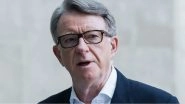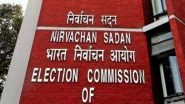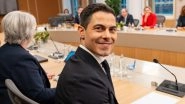Washington, Feb 18 (AP) Vice President Kamala Harris will face her highest-stakes foreign policy assignment yet this weekend in Germany, where she will try to keep European allies unified amid growing concern over the threat of a Russian invasion of Ukraine.
She will attend the annual Munich Security Conference as President Joe Biden and other Western leaders warn that the threat of an invasion remains high despite Russian President Vladimir Putin's statements that he is committed to further talks.
Also Read | Russia-Ukraine Crisis: India at UNSC Emphasises Quiet, Constructive Diplomacy, Backs Minsk Agreements.
The Kremlin has made unverified claims that some of the estimated 150,000 Russian forces encircling Ukraine have been pulled back to their garrisons. White House officials dispute that, saying intelligence shows Russia has added 7,000 additional troops near Ukraine in recent days and has stepped up preparations for potential false flag operations that could be used as a pretext to start a war.
Harris is scheduled to meet Friday with NATO Secretary-General Jens Stoltenberg and hold a multilateral meeting with the leaders of the Baltic states of Latvia, Lithuania and Estonia on the margins of the Munich conference. She's scheduled to deliver a major address Saturday on the administration's efforts to stop Russian aggression.
Also Read | Russia-Ukraine Crisis: Threat of Russian Invasion ‘Very High’, Says US President Joe Biden.
After the speech, she's expected to meet with Ukrainian President Volodymyr Zelenskyy and German Chancellor Olaf Scholz.
White House press secretary Jen Psaki said Harris would "convey to the rest of the world again our ironclad commitment to our NATO allies, our commitment to defending the territorial integrity and sovereignty of Ukraine, and our commitment to putting in place severe economic consequences should Russia invade."
The Munich gathering has been used in recent years by both US and Russian leaders to deliver messages to a who's-who of trans-Atlantic leaders.
Then-Vice President Mike Pence in 2019 made a full-throated case for President Donald Trump's "America First" worldview, receiving a tepid response from the mostly European crowd. Hours later, Biden, then a private citizen and not yet a 2020 presidential candidate, assured European allies that "this too shall pass" and "America will be back."
In 2007, Putin used his own Munich appearance to deliver a broadside against NATO, accusing the alliance of putting "its frontline forces on our borders." At last year's conference, held virtually due to the coronavirus pandemic, new president Biden declared "America's back" in an address that touched on economic and security concerns driven by adversaries Russia and China.
Harris heads to Munich at a moment when the Biden administration is trying to prod Moscow to de-escalate what has become the biggest security crisis between Russia and the West since the Cold War.
In a mark of how rapidly the situation was evolving, in the time it took Harris to fly to Munich on Thursday, Biden issued a stark new threat that an invasion could happen within "several days," Russia expelled the second-highest US diplomat in Moscow and Russia's Foreign Ministry handed over its formal reply to US and NATO security proposals.
The public-facing efforts by the Biden administration throughout the crisis have largely been entrusted to the president's national security adviser Jake Sullivan and Secretary of State Antony Blinken, who will also be in Munich.
But Harris has been a constant presence by Biden's side throughout the crisis, according to a senior administration official who briefed reporters ahead of her trip. The vice president attends the presidential daily briefing with Biden most mornings in the Oval Office. And she's been a constant presence in White House strategy sessions about countering Russia, the person said.
Munich offers an opportunity for Harris to demonstrate her foreign policy chops after what has been a sometimes choppy first year of her vice presidency. Her portfolio includes addressing a litany of difficult policy problems that have no clear solution or immediate payoff. Among the tough tasks on her plate are driving the administration's push for a voting rights bill and addressing the root causes of migration to the US southern border.
"This is really an important moment for Harris and the administration," said Heather Conley, president of the non-partisan German Marshall Fund of the United States. "I think if she can deliver a clear speech that reflects not just inspiration of US leadership, but real action, real meat of what they are trying to do, it will make a big impression going forward."
The conference, which begins Friday, will mark Harris's fifth foreign trip as vice president. On past trips she visited Guatemala and Mexico; Singapore and Vietnam; France; and most recently Honduras.
Matt Bennett, executive vice president at the centre-left think tank Third Way and an aide to Vice President Al Gore in the Clinton White House, said the Munich conference provides the kind of backdrop where Harris, a former prosecutor, can stand out.
"In the Senate, she was at her best when litigating her case against an adversary," Bennett said. "These are the moments she's made for." (AP)
(The above story is verified and authored by Press Trust of India (PTI) staff. PTI, India’s premier news agency, employs more than 400 journalists and 500 stringers to cover almost every district and small town in India.. The views appearing in the above post do not reflect the opinions of LatestLY)













 Quickly
Quickly


